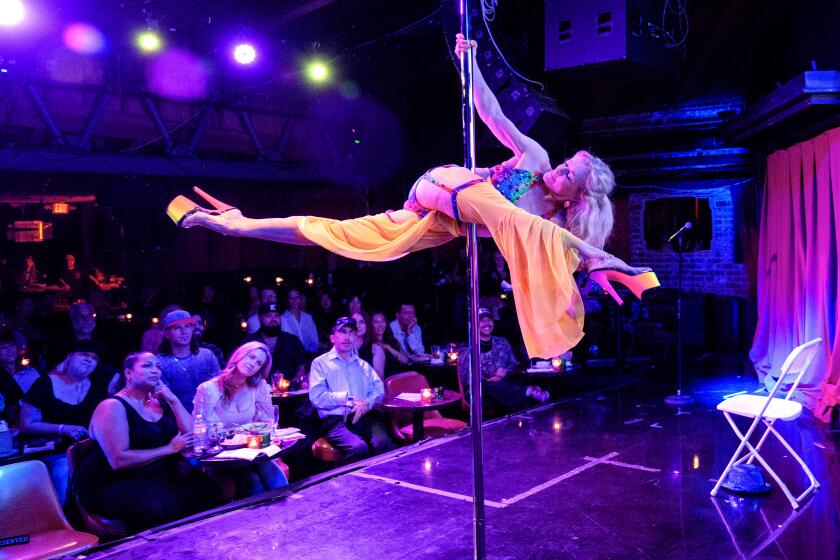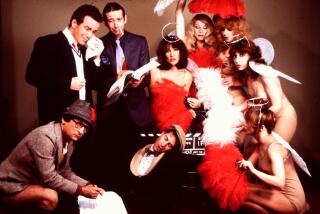
- Share via
- The Grey Quill Society is a weekly memoir writing group for residents of the Motion Picture and Television Fund’s community for aging entertainment professionals.
- Having the space to recount their lives has given members purpose in the later stages of their lives.
- “Here you can tell your stories and people understand because they have their own stories too.”
Seated at a folding table in a large sun-filled room, Melody Sherwood adjusted the portable microphone stand and started to read.
“One of Cary Grant’s favorite things to do was to tell stories,” she began in a voice like an old-fashioned schoolteacher. “He had an abundant supply. One of my favorite things to do was listen to him tell them.”
Sherwood, a close friend of Grant’s who spent 30 years working as Lew Wasserman’s executive assistant at Universal, went on to relay an only-in-Hollywood tale involving Grant’s first time entertaining troops overseas, a practical joke by the actor David Niven and why for the last 50 years she’s had a vanity license plate with the letters GAFY printed on it, an acronym for “Go And F— Yourself.”

It was a surprisingly spicy story for a seemingly buttoned-up 81-year-old woman, but bold-faced names and the occasional curse word are par for the course at the Grey Quill Society, a weekly memoir writing group for residents of the Motion Picture and Television Fund’s Woodland Hills community for aging entertainment professionals. That morning, the group had already heard from a retired character actor about the time Doris Day persuaded her to help rescue a starving dog in Beverly Hills. A former Flamenco dancer shared a tale about her nerve-racking stint working for Morris “Moishe” Levy, a music business executive with reported mob ties.
- Share via
Bob Beitcher, president and CEO of MPTF, who drops in on Grey Quill meetings whenever he can, looked up the Flamenco dancer’s former boss on his phone after she finished her story.
“Moishe Levy was a prominent subject of investigations into organized crime and was convicted for extortion just before his death,” he read off Wikipedia.
“That’s my guy!” she replied, flashing a camera-ready smile.
Run by 40-year-old writer and producer Victoria Bullock, the Grey Quill Society is part writers room, part support group and occasional stand-up show. Its roughly two dozen members range in age from 65 to 95 and many agree that the two-hour meeting is the highlight of their week. Few of them knew each other before moving to the MPTF campus, but their shared experience working in Hollywood gives them an easy rapport.
Mary Serritella started pole dancing at 57. Fourteen years later she’s inspiring others who are decades her junior.
“It’s such a unique group of people because we have all spent our lives in the industry,” said Sherwood, who moved into a 1940s-era cottage at MPTF nine months ago. “Here you can tell your stories and people understand because they have their own stories too.”
The show must go on
Conceived by silent film star Mary Pickford, the Motion Picture and Television Fund was founded in 1921 to care for people in the entertainment industry who had fallen on hard times. In its early years the organization was funded in part by a payroll pledge program for studio workers earning more than $200 a week and by a popular radio program, “The Screen Guild Theater,” in which stars like Judy Garland, Humphrey Bogart and Joan Crawford donated their salaries to MPTF for appearing on the show. These revenue streams allowed the nonprofit to break ground on a 48-acre campus in 1941 where it would eventually open a hospital and housing for 250 people under the motto “We take care of our own.”
Touring the campus in 1948, famed Hollywood columnist Hedda Hopper described the property as “like a fabulous country club beautifully situated amidst gardens, oak trees, and all kinds of flowering shrubs.”
“I’ve paid $30 a day at a country club or hotel for much less,” she wrote, adding that she wanted to submit her own application.

Today the grounds feature an extensive rose garden, a dog park named Doggywood, a 230-seat theater with a red brick “carpet” leading to its entrance, the Jodie Foster Aquatic Pavilion and a stylish potting shed that has become a popular place for residents to enjoy another type of “pot.” You’ll find Mary Pickford’s ornate heirloom grandfather clock outside the communal library where trade magazines like Variety and the Hollywood Reporter are laid out each day. The song “Somewhere Over the Rainbow” was composed on a piano near the entrance of one of the living facilities.
MPTF offers a range of housing options including independent living in classic 1940s cottages and modern condos, assisted living apartments, skilled nursing facilities and memory care. To qualify for housing most residents need to be at least 70 years old and have worked for 20 years in the industry, or be married to someone who did (there is some wiggle room around the age requirement for people in need of medical care). Those who can afford to pay for room and board do. Those who can’t are subsidized by MPTF for as long as needed. Currently about 50% of residents receive some kind of subsidy. The waitlist for independent living units is generally a week to six months. For memory care and skilled nursing it can be up to a few years.
“I didn’t come here thinking I was a writer. I found out I am.”
— David Quick, MPTF resident
“Creativity is ageless” is another motto on campus. Residents can choose from an array of classes including ceramics, piano, studio art and improv. There is also an in-house production studio that offers community members the opportunity to conceive of and host their own shows and film produtions.
The Grey Quill Society began in 2013 as a four-week memoir writing class that has continued indefinitely. The group has published five essay compilations available for purchase at Amazon and celebrities like Jon Hamm, Matthew McConaughey, Billy Porter and Yvette Nicole Brown have read some of the Quills’ stories aloud as part of a fundraiser. Hawk Koch, a film producer and former president of the Academy of Motion Picture Arts and Sciences, is a regular attendee. He doesn’t live on campus, but he makes the drive from Ojai each week to attend meetings and occasionally read from his book “Magic Time” about his Hollywood days.
The group’s founding leader was volunteer Peter Dunne, a writer, producer and writing instructor who worked on “Dallas,” “Melrose Place” and “Sybil.” Dunne taught the Quills that there is a difference between autobiography and memoir. If autobiography is a recording of facts in chronological order, then memoir seeks to focus on specific moments, episodes or people who changed the writer — for better or worse. He wanted the group to endeavor for the latter.

“During Peter’s days it was guys talking about their experience in WWII for the first time, women talking about experiences in their career that were very dark, people saying I never told this story to anyone,” Beitcher said. “It was very therapeutic and amazing to see such a safe space where people could tell those stories.”
Bullock began attending the weekly sessions after meeting Dunne at an appreciation event for MPTF volunteers in 2014. When Dunne left L.A. in 2019, Bullock took over the group. She sees her role as making sure participants feel seen and heard, gently directing discussions and encouraging members to dig deeper in their writing.
“Some of them really think it’s about the writing, and of course it’s great when it’s good writing, but that’s not the most important part,” she said. “There’s very much a sacred circle of Quills. They get real vulnerable, and I do too.”
A creative retreat
Although most of the Quills did not work as professional writers, many say that having the space to tell their stories has given them purpose and joy in the later stages of their lives, as well as an opportunity to exercise the creative drive that brought them to the entertainment industry in the first place.
“It’s just kind of keeping your foot in the door, because otherwise you get a little crazy when you have that drive,” said Jodie Mann, 76. “This is the only place I have to be creative.”
David Quick, a former prop master, said that the process of composing stories for the Quills and sharing them at the weekly meetings is the most important thing in his life.
“I didn’t come here thinking I was a writer,” he said. “I found out I am.”

J. Rickley Dumm, 84, is one of the few members of the Grey Quill Society who wrote for a living before moving to the MPTF in 2019. He started his career in the mailroom at Universal and became a writer and producer for television shows like “Rockford Files” and “Magnum P.I.” When his Hollywood career ended he began writing novels.
When Dumm first joined the group he told Bullock that he was never going to write about himself. Soon, however, he wrote a piece about a stutter that plagued him during his youth. He’s been writing personal stories ever since.
Strength training has many benefits for health and longevity. Now many older Angelenos are seeking out a method called slow-motion strength training to protect their joints and heal injuries.
Dumm’s speaking voice isn’t as strong as it once was, so he often asks his friend Guerin Barry, who sang with the American rock ‘n’ roll group Sha Na Na and is a skilled voice actor, to read his stories aloud. On a recent Thursday he shared a eulogy for his friend and fraternity brother John Stephen Dahlem, a high school principal, ordained minister, wrestling coach and marathon runner who summited the tallest mountains on all seven continents, including Mt. Everest twice.
After sharing the details of Dahlem’s life, Dumm concluded: “I’d wager that if I had not written this about my friend and fraternity brother, you probably would never have heard of him. Now you have!”
After Barry finished reading, Bullock handed Dumm a microphone so he could share a few additional thoughts. “We never dreamed he would do any of these things at the fraternity house,” he told the group. “He was a cut-up. He was a comedian. But for him, it wasn’t about the summit. It was about the climb.”
After he finished talking, Bullock shared her feedback. “That’s such a lovely metaphor for somebody who really understands life,” she said. “You’re enjoying the climb. Because once you get there, it’s over.”

Writing ‘the last chapter’
The subject of death doesn’t come up in every meeting of the Grey Quill Society, but it’s often there beneath the surface. Many Quills are in their 80s and 90s, and the group occasionally loses a member. Only one of the original Quills is still alive.
Bullock said grappling with the knowledge that many in the group are nearing the end of their lives is one of the hardest parts of the volunteer gig.
“You meet them, and you fall in love with them, and you are making a deal to break your own heart,” she said.
Joining a club or society where you might meet like-minded people has a wide range of health benefits. We’ve rounded up some long-standing ones in L.A. to get you started.
The MPTF always holds a memory service for residents after a death, but the Grey Quill Society has its own rituals when one of their own dies. Bullock picks a piece written by the member who passed to read aloud and then talks about that person’s journey at the Quills. Other members share their own memories.
Over the years Bullock has found that while the group doesn’t necessarily want to address death directly, they acknowledge that for most of them, MPTF is the last place they’ll live.
“We’re all very aware that this is the last chapter,” a friend from the Quills once told her. “But sometimes, the most interesting things happen in the last chapter.”
Stories live forever
On my second visit to the Grey Quill Society, a retired character actor shared a story about playing a cop on a television series and receiving a panicked phone call from her grandmother who was worried she had taken a dangerous job in the police force. A stage actor recalled the time she was in a production of “Arsenic and Old Lace” with Bela Lugosi, who she worried wanted to suck her blood. A former Shakespearean actor read a piece about the pleasure of indulging in a beautiful pair of Gucci loafers, which he wore around New York City. Sherwood had another story to share about Cary Grant, this time, about how they met when he offered her a ride home from the studio.
Free college classes, national park passes, cheap movie tickets, public transit rides and more. Growing older comes with bounties aplenty.
He told her he wasn’t good at marriage. She quipped that the next time he apply for a learner’s permit instead of a license.
Beitcher was there too, leaning against the wall, enjoying all of it.
“They say you never die until the last person who knew you dies,” he said. “I think they are extending their lives in some meaningful ways.”

More to Read
Sign up for The Wild
We’ll help you find the best places to hike, bike and run, as well as the perfect silent spots for meditation and yoga.
You may occasionally receive promotional content from the Los Angeles Times.
















